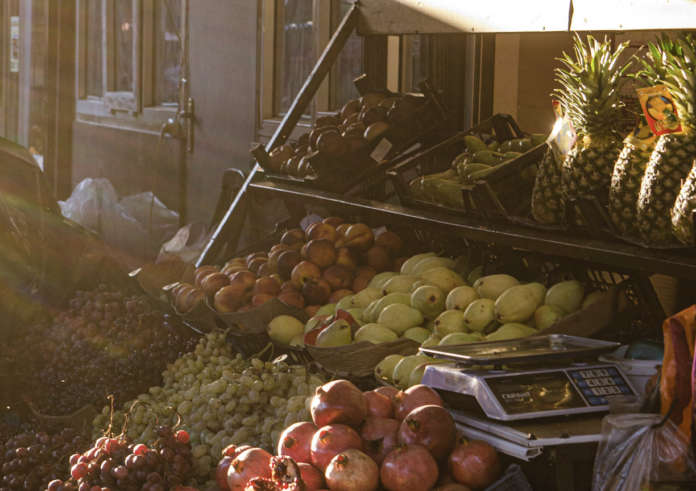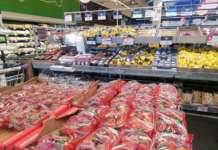Il climate change pesa sull’export dell’ortofrutta fresca italiana. Gli ultimi dati comunicati da Fruitimprese registrano gli effetti negativi di gelate, alluvioni, caldo estremo, fitopatie, che si traducono in danni da 6 miliardi per l’agricoltura italiana, secondo Coldiretti. Continua, pertanto, la diminuzione dei volumi: meno 2,2% in quantità nei primi nove mesi dell’anno anche se in valore si registra un +5,4% (ma va tenuto conto il dato inflattivo) e sfiora i 4 miliardi. Peggiora ancora il saldo commerciale, con 141 milioni di euro di surplus (-51,6% rispetto al dato del 2022). In volume l’import supera l’export di 425.753 tonnellate. A incidere negativamente sul risultato la performance della frutta secca (-14,2%), il cui export soffre della scarsità di prodotto a disposizione e del calo dei consumi. E soprattutto della frutta fresca, le cui esportazioni in quantità sono in calo del 7,6%. Valori invece positivi per gli agrumi, che segnano un +8,7% in volume e +20% in valore. Bene anche tuberi, ortaggi e legumi con esportazioni in quantità in crescita del 7,5% e del 19,4% in valore. Positivo anche l’export di frutta tropicale (+7,6%). Tra i prodotti più esportati, in calo le mele (-3,83%) che comunque segnano un +4,94% in valore; i kiwi confermano il trend in crescita dei mesi precedenti, con un ottimo +11,08% in quantità e un +6,47% in valore. Molto bene gli agrumi con le arance che segnano un +7,66% in volume e +25,47% in valore, e i limoni che salgono circa del 10% in tutti e due gli indicatori.
Dall’Ue troppi divieti senza soluzioni
Il presidente di Fruitimprese Marco Salvi ha sottolineato le preoccupazioni degli operatori per le crisi di referenze come le pere e le pesche (-44,15% l’export in volumi di quest’ultime), che stanno soffrendo più di altri i cambiamenti climatici, ma la riflessione è più ampia. “Il calo produttivo a livello nazionale dipende da vari fattori.
Sicuramente incidono il cambiamento climatico: le gelate primaverili, in alcune regioni come l’Emilia-Romagna, hanno colpito per ben tre anni sue cinque. Sono apparse nuove fitopatie a causa anche della riduzione della disponibilità dei prodotti fitosanitari. Ci sono poi problematiche che arrivano da Paesi lontani, per citarne una gli insetti alieni come la cimice asiatica.
Per fortuna la proposta della Commissione europea del dimezzamento degli agrofarmaci è stata rimandata alla prossima legislatura. C’è poi il problema della perdita di competitività dei prodotti nazionali dovuti ai maggiori costi di produzione rispetto ad altri competitor che non ci permette di remunerare adeguatamente gli agricoltori e frutticoltori.
Oggi per produrre frutta gli imprenditori sostengono costi maggiori di energia elettrica, gasolio, imballaggi e altri mezzi di produzione. Anche l’accanimento sul divieto di utilizzo della plastica per le confezioni monouso sotto il chilo e mezzo rappresenta un grande preoccupazione, perché serve a proteggere e garantire la shelf-life del prodotto: si pretende di eliminare imballaggi e prodotti fitosanitari senza aver trovato prima alternative”.
Molte aziende stanno investendo su varietà innovative più resilienti, ma il presidente auspica che l’Ue possa trovare una linea di intesa sulle Tea, anche se la normativa sarà più facilmente affrontata con il nuovo Parlamento. “È un’innovazione che va sostenuta e provata per rispondere alla riduzione della chimica”.
Altra risposta individuata è l’apertura di nuovi mercati, che cercano il made in Italy. Sulla questione degli accordi fitosanitari, dopo l’apertura del mercato cinese alle pere, si guarda a nuove destinazioni del Sudest asiatico e al Messico.
New markets and varietal innovation to boost exports
Climate change and plant diseases require Italy to speed up phytosanitary agreements, waiting to see the AETs legitimized, as underlined by Marco Salvi, president of Fruitimprese
Climate change weighs on the export of fresh Italian fruit and vegetables. The latest data communicated by Fruitimprese record the negative effects of frosts, floods, extreme heat, plant diseases, which translate into 6 billion Euros in damages for Italian agriculture, according to Coldiretti. Therefore, the decrease in volumes continues: -2.2% in quantity during the first nine months of the year, even if in value there was a +5.4% (but inflation must be considered), and it is close to 4 billion Euros. The trade balance is getting even worse, with a surplus of 141 million Euros (-51.6% compared to 2022). In volume, imports exceed exports by 425,753 tonnes. The performance of dried fruit (-14.2%), whose export suffers from both scarcity of available product and decline in consumption, had a negative impact on the result. And this situation concerns above all fresh fruit, whose exports in quantity are decreasing by 7.6%. However, positive values for citrus fruits, which recorded +8.7% in volume and +20% in value, were recorded. Tubers, vegetables, and legumes also did well with exports, in quantity growing by 7.5% in volume and 19.4% in value. The export of tropical fruit was also positive (+7.6%). Among the most exported products, apples are decreasing (-3.83%), but still recording +4.94% in value; kiwis confirm the growth trend recorded in previous months, with an excellent +11.08% in quantity and +6.47% in value. Citrus fruits did very well with oranges, recording +7.66% in volume and +25.47% in value, and lemons rising by approximately 10% in both indicators.
Too many prohibitions from the EU without solutions
Marco Salvi, president of Fruitimprese, underlined operators’ concerns about the crises of such products as pears and peaches (-44.15% in export volumes of peaches), which are suffering more than others from climate change, but the reflection is broader. ‘The decline in production at a national level depends on various factors. Climate change certainly has an impact: spring frosts, in some regions such as Emilia-Romagna, have affected agricultural productions for three out of five years. New plant diseases have appeared also due to the reduction in the availability of plant protection products. Then there are problems that come from distant Countries, to name one, such alien insects as the Asian bug. Fortunately, the European Commission’s proposal to halve agrochemicals has been postponed until the next legislature. There is also the problem of the loss of competitiveness of national products due to the higher production costs compared to other competitors, which does not allow us to adequately remunerate farmers and fruit growers. Today, to produce fruit, entrepreneurs incur higher costs of electricity, diesel, packaging, and other means of production. The insistence on the prohibition on the use of plastic for single-use packaging under one and a half kilos is also a great concern, because it serves to protect and guarantee the shelf-life of the product: the aim is to eliminate packaging and plant protection products without having first found alternatives’. Many companies are investing in more resilient innovative varieties, but the president hopes that the EU can find an agreement on AETs, even if the regulation will be more easily addressed with the new Parliament. ‘It is an innovation that must be supported and tested to respond to the reduction of chemistry’. Another response identified is the opening of new markets, which seek Made in Italy. On the issue of phytosanitary agreements, after the opening of the Chinese market to pears, operators are looking at new destinations in Southeast Asia and Mexico.









